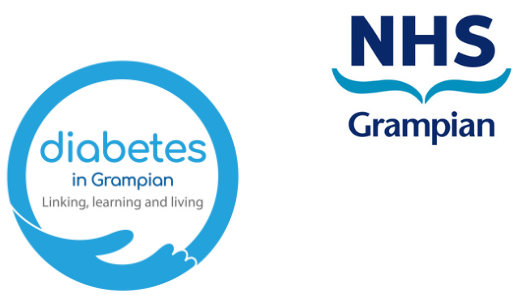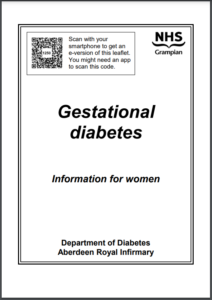Gestational Diabetes is when your blood glucose levels increase during pregnancy. It occurs due to some of the hormones produced during pregnancy affecting the way insulin works. Insulin is the hormone which helps control your blood glucose levels.
Most women with Gestational Diabetes will have a healthy baby and a normal pregnancy, but if left unmanaged, Gestational Diabetes may cause serious health problems for you and your baby.
Gestational Diabetes can cause problems such as your baby to grow larger than normal, which can lead to a more painful or difficult birth and possible distress for baby. It can also cause neonatal hypoglycaemia, which is when your baby has low blood sugar after birth.
The good news is that controlling your blood glucose levels with diet, physical activity levels, tablets and/or insulin can help keep the glucose levels as close to normal as possible and reduce these risks.
Any woman can develop Gestational Diabetes during pregnancy, but you’re at an increased risk if:
- you are over 40
- your body mass index (BMI) is above 30 – use the BMI healthy weight calculator to work out your BMI
- you previously had a baby who weighed 4.5kg (10lb) or more at birth
- you had Gestational Diabetes in a previous pregnancy
- 1 of your parents or siblings has Diabetes
- you are of South Asian, Black, African-Caribbean or Middle Eastern origin (even if you were born in the UK)
If any of these apply to you, you should be offered screening for gestational diabetes during your pregnancy.
If you are at risk of Gestational Diabetes you should have your HbA1c tested in early pregnancy to make sure your blood glucose levels have been normal and you don’t have diabetes. You will be reassessed around 28 weeks and may be offered an Oral Glucose Tolerance Test.
If diagnosed with Gestational Diabetes you will have access to:
- Individual support from our specialist team who will be in contact with you on a regular basis to support you and provide you with specific advice about your own food choices and to help you keep your glucose levels on target for the duration of your pregnancy.
- You will also be invited to attend a Gestational Diabetes Education session, either in a group or individually. As there is a lot of information it can be helpful to involve your partner and family members to support you.
- A blood glucose meter to monitor your glucose levels
- Access to information about gestational diabetes
Further monitoring of glucose levels with a blood test for HbA1c:
- At least 3 months postnatal – to make sure your blood glucose levels have returned to normal
- Once a year HbA1c – to detect any increase in blood glucose levels which may indicate prediabetes or type 2 diabetes
- Before future pregnancies – to rule out diabetes before planning any future pregnancies.
The Diabetes Supported Self-Management Service can provide support around:
- Exploring physical activity levels and whether would be sensible to increase in pregnancy
- Helping to adjust or improve eating habits and patterns during pregnancy in the context of Gestational Diabetes
- Providing strategies to help manage mild-moderate stress/anxiety and/or low mood that might getting in the way of efforts to self-manage health and blood glucose levels during pregnancy
Please see our YouTube video about the support we offer.
To find out more or arrange an appointment for 1:1 support, you can email or call a member of the team.
– Email: gram.actnow@nhs.scot
– Telephone: 01224 655755
Towards the end of pregnancy you will need a plan for delivery, contraception and future follow up of your blood glucose levels.
Plans for your delivery will be discussed with you during your antenatal appointments. General information about delivery is available from the Birth in Grampian Website. During delivery your blood glucose levels will be monitored to try and keep as close to normal as possible. Sometimes glucose levels can increase and you may need extra insulin. If you have a Caesarean Section before 39 weeks gestation, you may need steroids to help your baby’s lungs mature. Sometimes steroids can increase your blood glucose levels and you may need insulin for this too.
You should have your blood glucose levels checked a few times in the initial 24 – 48 hours following delivery to check they have gone back to normal.
If you’ve had Gestational Diabetes, you have up to a 1 in 2 chance of developing Type 2 Diabetes in the next 5-10 years. You are also at higher risk of developing Type 2 Diabetes for the rest of your life and having Gestational Diabetes in future pregnancies.
If you have had Gestational Diabetes it’s important to continue to have your Hb A1c checked :
- At least 3 months postnatal – to make sure your blood glucose levels have returned to normal
- Once a year HbA1c – to detect prediabetes or type 2 diabetes
- Before future pregnancies – to rule out diabetes before becoming pregnant.
In addition to the information given to you by the Diabetes Maternity team, there are lots of different ways to learn about Gestational Diabetes. Here are some suggestions:
- NHS Grampian Information Leaflet about Gestational Diabetes
- For general information and browsing about Gestational Diabetes try the Diabetes UK website.
- NHS Grampian Gestational Diabetes Leaflet – What you Should Expect
- You can also download an information pack from Diabetes UK
- My Diabetes My Way GDM course offers step by step interactive modules to help you gain a deeper understanding.
- Download some advice about managing Gestational Diabetes in Grampian
- NHS Inform Eat Well Guide
- Healthy Eating for Gestational Diabetes
- Healthier Food Swap Suggestions
- Download examples of food swaps to help improve blood glucose levels.
- Video guide for checking your blood glucose level
- Watch the video for more information about how to use your blood glucose monitor.
Hearing about others people’s experience of Gestational Diabetes can be very helpful. Here are some videos for you to watch.

